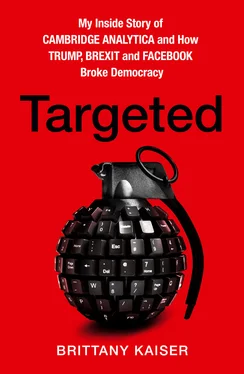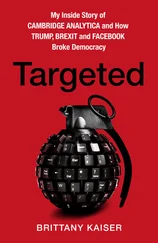Alexander arranged for me to entertain the Nigerians at a luxury hotel, directing me to host them for a lavish meal. I’d never been given so much responsibility with so much hanging in the balance.
When I arrived in Madrid, I found Prince Idris waiting with only one Nigerian, and even he was not the one I had expected. The clients, it appeared, had flown in a representative to take the meeting. He was a tall, looming, thick-bodied man of early middle age, but I could see that he was terribly nervous, which made me feel better.
I made it through the first day, showing our potential client the proposal and talking through the basics of what I understood SCL could do for his boss. The company offered services such as opinion polling, caste and tribe research, opposition research, and even “competitive intelligence”—that is, state-of-the-art information gathering that could be used to research candidates’ personal and financial backgrounds and explore historic party dealings or “hidden activities.” I wasn’t so naïve as to think that this wasn’t negative campaigning, but I knew that at this late stage in the game, it might be necessary to show results quickly.
There was no time to do what SCL called a “party audit,” a census to collect members’ details, including their polling station and political affiliation. Nor could we clearly identify swing voters. But we could do strong get-out-the-vote work in regions where there was already great support for Goodluck Jonathan. And if we achieved a wide enough margin, that would serve to quell mistrust in the results and perhaps prevent violence in the postelection period.
I was relieved when Alexander arrived on the second day to do the formal pitch. To see him in full pitch mode was undeniably a thing of beauty. He was eloquence and elegance personified. He was self-assured and unhalting in his delivery, an appealing figure in his crisp navy suit and silk tie and more charismatic than most gentlemen one would ever meet. I regarded him with warmth and a degree of admiration that it had not occurred to me before I would ever feel for him.
The start of his pitch included much the same material he covered when Chester and I visited the SCL office back in October—the same slides with pictures of beaches and signs about sharks, the same points about Mad Men , the same top-down-versus-bottom-up creativity and blanket versus targeted advertising based on scientific and psychological research, but it felt more fluid, theatrical, and persuasive now. It seemed effortless, as perfectly managed and choreographed as the best TED Talk. With the small remote control firmly in his hand, Alexander, it seemed to me, had his finger on a button that had the potential to control the world.
The billionaires’ representative was rapt, and he leaned in, as did the prince, and nodded from time to time approvingly. And when Alexander got to the part of the presentation about how the company had the ability to, as he put it, “address individual villages or apartment blocks, even zoom right down to particular people,” their eyes widened.
How SCL did that was just a part of what made it different from all other election companies in the world. It was not an advertising firm, Alexander said, but a psychologically astute and scientifically precise communications company.
“The biggest mistake the political campaigns and communication campaigns face is starting where they are and not where they want to be,” Alexander said. “They tend to start with a preconceived idea of what is required. And that’s normally based on the subject matter.”
So, he said, SCL often walked into situations where clients tried to tell it what to do. Usually, a client’s idea was that they needed posters everywhere and TV adverts, Alexander said.
“Well,” he asked, “how do you know that that’s the right thing to do?”
The client raised his eyebrows.
“Because we’re not interested in the president or the party or whoever the client is,” Alexander said dismissively. “We’re interested in the audience .” He paused for a second for effect and pulled up a slide. On it was a picture of an audience in a movie theater staring up at the screen.
“The way to illustrate this,” he said, pointing to the slide, “is you want to sell more Coca-Cola in a movie theater, yeah?”
The client nodded.
“You ask an advertising agency what their plan is, and they’ll say, ‘You need more Coke at point of sale, you need Coke branding, you need a Coke advert before the main movie.” Alexander shook his head. “And it’s all about Coke,” he said. And that’s the problem with political campaigns.
“But,” he went on, clicking to another slide—this one showed images zooming left, right, and center, all of Coca-Cola advertising and branding, all quickly becoming overwhelming—“If you stop and look at the target audience and ask questions like ‘Under what circumstances would they drink more Coke?’ and you research them, you might find that they’re more likely to drink a Coke when they’re thirsty.”
Again, he paused.
“So,” he continued, “what you want to do,” he said, clicking to another slide, “is simply turn up the temperature … in the auditorium.”
The image on the slide was of a cartoon-like thermometer, the mercury in red, risen to almost bursting.
The solution, Alexander said, isn’t in the advert. “The solution is in the audience.” He paused again to make sure this had sunk in.
The solution is in the audience, I thought. It had never occurred to me to think this way.
It was a stunning moment, as eye-opening to me as what he had said in his initial presentation to Chester and me about the worthlessness of blanket advertising. Here was a brilliant concept: to get people to act, you created the conditions under which they would be more likely to do what you wanted them to do. The simplicity of the concept blew my mind.
Alexander said that SCL had done this again and again across the world.
In Trinidad and Tobago in 2010, he said, pulling up slides, the company had addressed that nation’s “mixed ethnicity.” (Half the nation was Indian, the other half Afro-Caribbean.) “Political leaders from one group there,” he said, “had difficulty making their messages resonate with those outside it.” SCL had therefore designed an ambitious program of political graffiti that it disseminated as campaign messages. And the youth vote had turned out in droves.
Brilliant, I thought. Getting out the youth vote was so difficult during elections.
In Bogotá, Colombia, in 2011, SCL had found that in a country with rampant corruption, the general population mistrusted all the candidates who were running, so SCL “enlisted others” to endorse the candidates instead. Having locals vouching for the candidate was highly effective, with no trace of the candidate’s face him- or herself.
How quickly could the Nigerians see results from SCL if it were to work in the upcoming election? the representative wanted to know.
I knew what Alexander was going to say, because I had read about it in the SCL brochures: SCL’s services were “results oriented.” The company always worked with its clients to ensure that the effects of its services were “readily identifiable and measurable.”
The representative looked pleased.
After the presentation, Alexander and I had dinner together. We spoke about the Nigerian campaign and all the other campaigns he’d done through the years, and I realized that Alexander Nix could likely be the most experienced elections consultant in the world. I began to see him as an important mentor. And while it had been difficult to get to know him in the first few weeks of the job, now he invited me to come out and visit his family or come see him play in a polo match. I was surprised when I realized that both sounded quite nice, in fact.
Читать дальше












